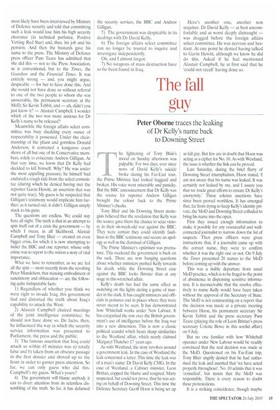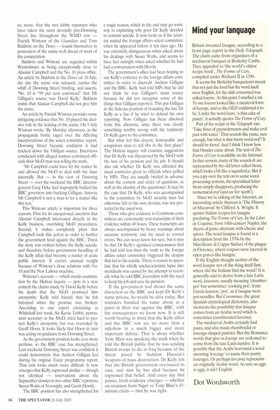The fa guy
Peter Oborne traces the leaking of Dr Kelly's name back to Downing Street
The lightening of Tony Blair's mood on Sunday afternoon was palpable. For two days, ever since news of David Kelly's suicide
broke during his Far-East tour, the Prime Minister had looked haggard and broken. His voice went miserable and panicky. But the BBC announcement that Dr Kelly was the source for reporter Andrew Gilligan brought the colour back to the Prime Minister's cheeks.
Tony Blair and his Downing Street strategists believed that the revelation that Kelly was the source gave them the chance to seize victory in their six-week-old war against the BBC. They were certain they could identify faultlines in the BBC testimony and secure an apology as well as the dismissal of Gilligan.
The Prime Minister's optimism was premature. This weekend the government is back on the rack. There are now hanging questions about whether ministers pushed Kelly towards his death, while the Downing Street case against the BBC looks flimsier than at any stage in this wretched affair.
Kelly's death has had the same effect as switching on the lights during a game of murder in the dark. It has caught ministers and officials in postures and in places where they were never meant to be seen. It has demonstrated how Whitehall works under New Labour. It has catapulted the row over the British government's use of intelligence before the Iraq war into a new dimension. This is now a classic political scandal which bears sharp similarities to the Westland affair, which nearly claimed Margaret Thatcher 17 years ago.
As with Westland, the story revolves around a government leak. In the case of Westland the leak concerned a letter. This time the leak was of a man's name: Dr David Kelly CMG. In the case of Westland, a Cabinet minister, Leon Brittan, copped the blame and resigned. Many suspected, but could not prove, that he was acting on behalf of Downing Street. This time the Defence Secretary Geoff Hoon is being set up as fall guy. But few are in doubt that Hoon was acting as a cipher for No. 10. As with Westland, the issue is whether the link can be proved.
Last Saturday, during the brief flurry of Downing Street triumphalism, Hoon stated, 'I am not aware that his name was leaked. It was certainly not leaked by me, and I assure you that we made great efforts to ensure Dr Kelly's anonymity.' These solemn assertions have since been proved worthless. It has emerged that, far from trying to keep Kelly's identity private, the MoD and Downing Street colluded to bring his name into the open.
First they issued enough information to make it possible for any resourceful and wellconnected journalist to narrow down the list of suspects. Then press officers were given instructions that, if a journalist came up with the correct name, they were to confirm whether it was the right one or not. On 9 July the Times presented 20 names to the MoD before coming up with the answer.
This was a risible departure from usual MoD practice, which is to be frugal to the point of abstinence in dispensing sensitive information. It is inconceivable that the resolve effectively to name Kelly would have been taken without the approval of the Secretary of State. The MoD is not commenting on a report that the decision was made at a private meeting between Hoon, his permanent secretary Sir Kevin Tebbit and the press secretary Pam Teare (playing the role of Leon Brittan's press secretary Colette Bowe in this sordid affair) on 9 July.
But no one familiar with how Whitehall operates under New Labour would be readily convinced that the real decision was made at the MoD. Questioned on his Far-East trip. Tony Blair angrily denied that he had authorised the leak and asserted that 'we have acted properly throughout'. No. 10 admits that it was 'consulted', but insists that the MoD was responsible. There is every reason to doubt these protestations.
It is a striking coincidence, though maybe
no more, that the two lobby reporters who have taken the most devoutly pro-Downing Street line throughout the WMD row — Patrick Wintour of the Guardian and Tom Baldwin on the Times — found themselves in possession of the name well ahead of most of the competition.
Baldwin and Wintour are regarded within Westminster as being exceptionally close to Alastair Campbell and the No. 10 press office. An article by Baldwin in the Tunes on 10 July, the day the name was released, carries the whiff of Downing Street briefing, and asserts, 'No. 10 is "99 per cent convinced" that Mr Gilligan's source was David Kelly.' Baldwin insists that Alastair Campbell did not give him the name.
An article by Patrick Wintour provides some intriguing evidence that No. 10 played the decisive role in the leaking of the name. On 9 July Wintour wrote, `By Monday afternoon, as the propaganda battle raged over the differing interpretations of the select committee report, Downing Street became confident it had tracked down the Gilligan source. Interviews conducted with alleged sources convinced officials their MoD man was telling the truth.
'Mr Campbell could have let the matter lie and allowed the MoD to deal with the issue internally. But — in the view of Downing Street — over the weekend the BBC directorgeneral Greg Dyke had improperly bullied the BBC governors into backing Gilligan. Anyway Mr Campbell is not a man to let a matter like this rest.'
This Wintour article is important for three reasons. First for its unequivocal assertion that Alastair Campbell intervened directly in the Kelly business, overriding MoD procedures. Second, it makes completely plain that Campbell took this action in order to further the government feud against the BBC. Third, the story was written before the Kelly suicide, and therefore before government handling of the Kelly affair had become a matter of acute public interest. It carries unusual weight because of Wintour's close relations with No. 10 and the New Labour machine.
Wintour's account — which merits examina tion by the Hutton inquiry puts in a new context the claims made by David Kelly before his death that the MoD promised him anonymity. Kelly told friends that he felt betrayed when the promise was broken. According to one report circulating in Whitehall last week, Sir Kevin Tebbit, permanent secretary at the MoD, tried hard to protect Kelly's anonymity but was overruled by Geoff Hoon. It looks likely that Hoon in turn was acting on guidance from Downing Street.
As the government position looks ever more perilous, so the BBC case has strengthened. Last weekend Downing Street was confident it could demonstrate that Andrew Gilligan lied during his original Today programme report. That task looks much more difficult. It now emerges that Kelly expressed similar — though not identical — reservations about the September dossier to two other BBC reporters, Susan Watts of Newsnight, and Gavin Hewitt.
The BBC position has also strengthened for a tragic reason, which in the end may go some way to explaining why poor Dr Kelly decided to commit suicide. It now looks as if the scientist misled the foreign affairs select committee when he appeared before it ten days ago. He was extremely disingenuous when asked about his dealings with Susan Watts, and seems to have lied outright when asked whether he had had a conversation with Hewitt.
The government's allies had been hoping to use Kelly's evidence to the foreign affairs committee in order to discredit Andrew Gilligan and the BBC. Kelly had told MPs that he did not think he was Gilligan's main source because he did not recognise some of the things that Gilligan reported. This put Gilligan in the hideous position of branding the late Dr Kelly as a liar if he tried to defend his own reporting. Now Gilligan has been absolved from this dilemma, since there was clearly something terribly wrong with the testimony Dr Kelly gave to the committee.
But what led this decent, honourable and scrupulous man to tell fibs in the first place? The Hutton inquiry will examine suggestions that Dr Kelly was threatened by the MoD with the loss of his pension and his job. It should also ask whether Dr Kelly was afforded the usual courtesies given to officials when grilled by MPs. They are usually briefed in advance about the content and order of questions, as well as the identity of the questioner. It may be the case that Dr Kelly, who was accompanied to the committee by MoD security men but otherwise left to his own devices, was not protected in the usual way.
Those who give evidence to Commons committees are customarily sent transcripts of their evidence within 48 hours. These transcripts are always accompanied by heavy warnings about accurate testimony and the need to correct errors. We can never know for sure, but it may be that Dr Kelly's agonised consciousness that he had told less than the truth to the foreign affairs select committee triggered the despair that led to his suicide. There is reason to speculate that his wholly uncharacteristic lapse into mendacity was caused by the attempt to reconcile what he told BBC journalists with the need to keep his job and save his pension.
If the government had shown the same discretion as the BBC and kept Dr Kelly's name private, he would be alive today. But ministers bandied his name about as a pawn in their war against the BBC, with the consequences we know now. It is still worth bearing in mind that the Kelly affair and the BBC row are no more than a sideshow in a much bigger and more important debate. That is about whether Tony Blair was speaking the truth when he told the British public that he was sending British troops to die in Iraq because of the threat posed by Saddam Hussein's weapons of mass destruction. Dr Kelly felt that the British government overstated its case, and now he has died because he expressed that belief. And every day that passes, fresh evidence emerges — whether on uranium from Niger or Tony Blair's 45minute claim — that he was right.



























































 Previous page
Previous page